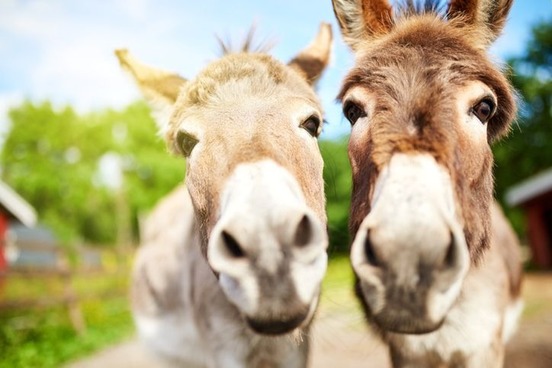
Pulchritudinous
Definition - physically beautiful
If the meaning of this word seems counterintuitive, it's probably because the word's Latin ancestor pulcher ("beautiful") is unfamiliar, and pulchritudinous sounds more disgusting than enchanting. We have been using pulchritude to refer to beauty since the 15th century. Pulchritudinous is a more recent addition to our language; its use dates to the early 18th century, and only began to be used to specifically refer to people’s beauty in the middle of the 19th.
The braided locks of the pulchritudinous fair ones, with their infinity of triple plaits, are lent to the mercies of the wind.
— The Athenæum (London, Eng.), 25 Sept. 1858

Consanguineous
Definition - of the same blood or origin; specifically : descended from the same ancestor
Consanguineous is sometimes used to describe marriages or intimate relationships, such as when geneticists discuss birth defects in the offspring of consanguineous unions (i.e., unions between close relatives). Nowadays, we understand that ancestral contributions are not transmitted through blood but through genes contained in chromosomes.
The middle portion of consanguineous comes from the Latin sanguin-, meaning “blood.” This root is also found in sanguine, a word which, confusingly enough, may be defined as “marked by eager hopefulness : confidently optimistic.” The reason for this is that an early meaning of sanguine was “having blood as the predominating bodily humor,” with humor here referring to “one of the four fluids entering into the constitution of the body and determining by their relative proportions a person's health and temperament.” If you prefer to use words in a logical etymological fashion (which is never a good idea) you may restrict your use of the word sanguine to its sense meaning “bloodthirsty” or “bloody.”
And my Daughter, who derives her Blood immediately from me, must needs be more Consanguineous or nearer of Kin to me than my Sister, who derives no Blood at all from me.
— Robert Dixon, The degrees of consanguinity and affinity described and delineated, 1674

Psychotomimetic
Definition - of, relating to, involving, or inducing psychotic alteration of behavior and personality
This word—from psychotic and mimetic (meaning "imitative")—first appeared in the 1950s, as mind-altering drugs began catching on with the public. The word's unpleasant association with psychosis inspired Dr. Humphry Osmond to coin the synonymous psychedelic. That shifted the emphasis to examining how the agent might help enlarge the vision or explore the mind.
The manner by which LSD-25 produces its mental changes is obscure. The letters LSD stand for lysergic acid diethylamide. The 25 identifies it as the 25th compound in the series. The drug itself is loosely classified as “hallucinogenic” or “psychotomimetic.”
— Joe Hyams, _The New York Herald Tribune, 8 Nov. 1959

Trichotillomania
Definition - an abnormal desire to pull out one's hair
Trichotillomania comes from combining roots from New Latin (trich, meaning “hair,” and mania) and Greek (tillein, meaning “to pull, pluck”). The word appears to have come about at the suggestion of a French doctor at the end of the 19th century.
Trichotillomania.—This name is proposed by M. Hallopeau for a condition described by him at the seance of the French Society of Dermatology and Syphilography … It is a morbid condition, consisting of exacerbations of pruriginous sensations in the hairy parts of the body, accompanied by a vesania, that leads the subjects to try to get relief by pulling out the hairs, hence the name given above.
— American Journal of Insanity (Baltimore, MD), Jul. 1894
By 1896 the word was already found defined in medical dictionaries, such as George M. Gould’s The Student’s Medical Dictionary (“an uncontrollable impulse to pull out one’s hair”).

Omphaloskepsis
Definition - contemplation of one's navel as an aid to meditation; also: lack of will to move, exert, or change: inertia
In Greek, omphalos means “navel" and skepsis means “examination." Most of us are familiar with at least some words which the latter of these roots shares parentage with (skeptic, skepticism), but omphalo- words are considerably more rare. Among them are omphaloid, which is defined as “resembling an umbilicus (“navel”).
Football, tennis, and even cinemas by barbarians from the West has tended to lower the popularity of omphaloskepsis by encouraging extravert types of recreation.
— The Times of India (Mumbai, Ind.), 17 Feb. 1928

Myrmecophilous
Definition - fond of, associated with, or benefited by ants
Scientists use myrmecophilous to describe the positive relationships between ants and such species as butterflies, crickets, beetles, and mites that help ants flourish. The word comes from Greek roots; myrmec- comes from that language and means “ant.” As English draws its vocabulary from a variety of languages we also have a number of ant-related words which come from Latin, and bear little orthographic resemblance to the myrmec- ones, such as formican (“of or relating to ants”).
Other plants suffer greatly from the ravages of the leaf-eaters, but the latter are driven off from the myrmecophilous plants by their ant friends.
— Saline Daily Republican (Salina, KS), 18 Jul. 1893

Xenotransplantation
Definition - transplantation of an organ, tissue, or cells between two different species
The Latin xeno- comes from the Greek word xenos, meaning "stranger" or “guest." We have a number of words in English which are built on this root, including xenial (“of, relating to, or constituting hospitality or relations between host and guest”).
Xenotransplantation is a recent word, dating from the 1960s, but the practice (or attempted practice) has been around for hundreds of years; cross-species transplants were (unsuccessfully) attempted in the 17th century. In the late 20th century, scientists transplanted primates' hearts, kidneys, and livers into humans with some success. Pigs have replaced primates as the prime candidates for xenotransplantation to humans, but the process remains experimental and controversial.
The infant, identified only as Baby Fae, was in critical by stable condition Friday evening, according to physicians who said they were pleased with the results of the surgery, known as xenotransplantation.
— The Times (Shreveport, LA), 27 Oct. 1984

Embourgeoisement
Definition - a shift to bourgeois values and practices
Embourgeoisement almost always refers to a shift by the working class, not the upper class. The word was coined during the first half of the 20th century, when scholars noticed workers adopting the outlook and behavior of the middle class. For example, the new bourgeois might have a declining interest in class consciousness and an increased interest in seeing gradual, not revolutionary, changes in society.
If this is true, we may expect to see a progressive embourgeoisement of the Soviet state; those educated and highly westernized intellectuals who once directed the fortunes of the “proletarian” republic (Trotsky, Zinoviev, Kamenev, Rakovsky, Radek, and their friends) must be submerged.
— Vincent Sheean, The China Weekly Review, 24 Mar. 1928

Polyphiloprogenitive
Definition - extremely prolific; tending to produce offspring, or characterized by love of offspring
There are some instances where progenitive (“of, relating to, or characterized by love of offspring”) isn’t quite long enough, or lacks the multi-affix oomph that the situation calls for. In cases such as this you may add poly to the beginning, although the two words are synonymous.
In one of her most ambitious skits, Miss Skinner appeared as a series of polyphiloprogenitive Americans and then as the clay-footed idols they worship.
— Orlando Evening Star (Orlando, FL.), 27 Jan. 1954

Tergiversation
Definition - evasion of straightforward action or clear-cut statement : equivocation
English has no shortage of words for “not quite telling the truth”; in addition to tergiversation we have equivocation, circumlocution, prevarication, and many others. This should not be seen as a reflection of the inability of the English-speaking people to tell the whole truth. Tergiversation, which comes from the Latin tergiversari (”to show reluctance”), has been use in English since the middle of the 16th century.
Therefore thys tergiuersation of the Anabaptistes is a blasphemye, which dishonoreth the Lord Iesus, as thoughe he had told vs a vayne tale to no purpose.
— Jean Calvin, A short instruction for to arme all good Christian people agaynst the pestiferous errours of the common secte of Anabaptistes, 1549

Impedimenta
definition - things that impede
While impedimenta also may mean “equipment, appurtenances” it is the “things that impede” sense that really makes this word shine. For who among us has not found ourselves weighted down with a needless assembly of people and things which serve little purpose but to provide impedance? This knowledge cannot rid you of these things, but it can make your own personal impedimenta feel a bit lighter.
Provided with a book, she was nothing loath to be home base and look after the cameras, sweaters and other impedimenta we always seemed to need for a picnic.
— Lisa Paterson, The Oregonian (Portland, OR), 8 Aug. 1984

Jackasseries
Definition - the actions of a jackass
It is admittedly far more common to encounter this word in its singular form jackassery, which may be defined as “doltishness,” but the plural form is occasionally found. For jackasses oft travel together, and even when but one is visible more are likely to be about, engaging in some sort of jackassery or other.
”Get by it!” sneered Lady Niton. “After all, his friends are in. They say he’s eloquent. His jackasseries will get him a bishopric in time—you’ll see.”
— Humphry Ward, Harper’s Monthly Magazine, 1 Jul. 1908

Connecticutian
Some U.S. states have names that seem to adapt easily to form the adjectives and nouns used when making reference to something or someone from that state—words that are called demonyms. For example, Californian, Vermonter, and Floridian are words that are easy to say and transparent in meaning. Other states, not so much. What do we call a person from Wyoming or Massachusetts? It seems that there are two kinds of state names—those from which demonyms form naturally, and those that don’t.
Connecticut is a hard word to spell, and it’s not at all obvious how to say “a native or resident of Connecticut” in a single word. Sure, someone will point out that Nutmegger is frequently used, but that’s not likely to occur to someone without deepish local knowledge. What’s a Connecticutter to do?
One word that has been proposed is Connecticutian, and it’s been used in straightforward contexts where the meaning is clear:
The big question now, of course, is whether Spielberg will actually change the film. If he does, Courtney definitely wins at fact-checking, and if he doesn't, well he's still an exceptional Connecticutian.
— Adam Clark Estes, theatlantic.com, 5 February 2013
But evidence also shows that it’s sometimes regarded as fanciful or self-conscious, showing that it has not yet gained easy acceptance:
Lindskoog's invention of "Massachusettsian" and "Connecticutian" forces me to confess that I haven't the slightest idea what the citizens of those two states are called.
— Jack Smith, The Los Angeles Times, 2 July 1991
It could be pronounced either \kuh-net-uh-KYOO-shun\ (like Lilliputian or Aleutian or \kuh-net-uh-KYOO-tee-un).
This word has a long history, but only time will tell if it ever catches on:
His own French was transparently Connecticutian.
— Putnam Magazine, December 1856

More Long Words
A number equal to 1 followed by 45 zeros is called a 'quattuordecillion'.
VIEW MORE LONG WORDS >





